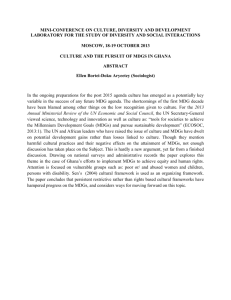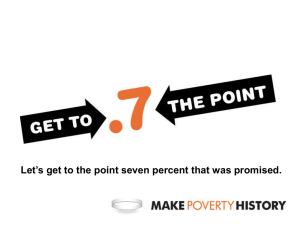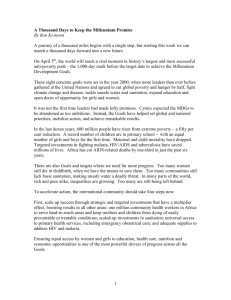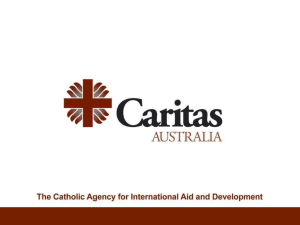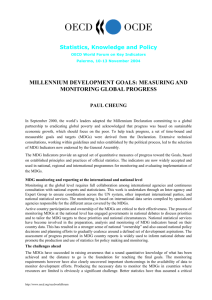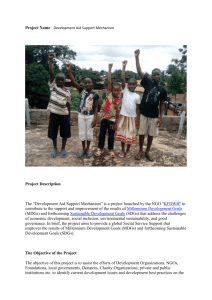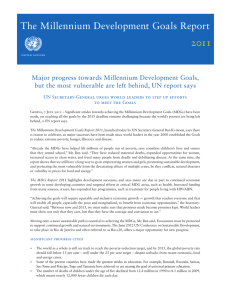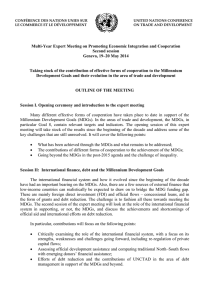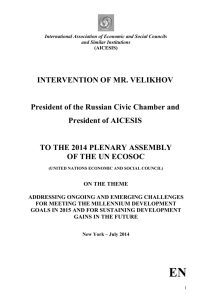The United Nations and the a core strategy 7 June 2002
advertisement
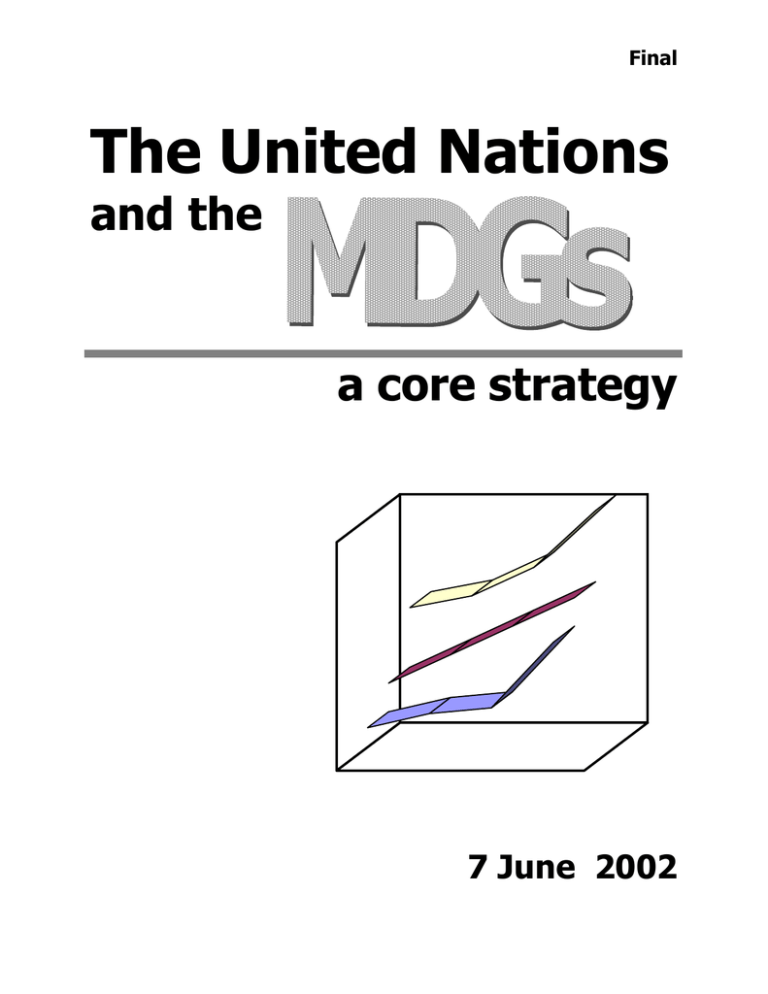
Final The United Nations and the a core strategy 7 June 2002 1 Core Strategy Introduction The UN and the MDGs: A Core Strategy: I. Introduction 1. The adoption of the Millennium Declaration in 2000 by all 189 member states of the UN General Assembly was a defining moment for global cooperation in the 21st century. The Declaration sets out within a single framework the key challenges facing humanity at the threshold of the new millennium, outlines a response to these challenges, and establishes concrete measures for judging performance through a set of inter-related commitments, goals and targets on development, governance, peace, security and human rights. The Declaration was the high point of a series of international conferences and summits beginning in 1990 with the World Summit for Children which has witnessed unprecedented agreement within the international community on a wide range of commitments and plans of action. 2. The Millennium Declaration also brings clarity to the shared and individual roles and responsibilities of key parties: of Governments to achieve or enable the achievement of goals and targets; of the network of international organisations to marshal their resources and expertise in the most strategic and efficient way possible to support and sustain the efforts of partners at global and country levels; of citizens, civil society organisations (CSOs) and the private sector, to engage fully in this ground-breaking effort, by bringing to bear their unique strengths for motivation, mobilisation and action. 3. The momentum achieved with the adoption of the Millennium Declaration was reinforced at the International Conference on Financing for Development (FfD), held in March 2002, which was the first attempt to examine comprehensively the means of mobilising resources for development, focusing on the goals and targets of the Declaration, especially the Millennium Development Goals (MDGs). The FfD Conference set the stage for policy decisions by the European Union and the United States which represented the first substantial pledge in more than a decade to reverse declining flows of official development assistance (ODA). Just as the FfD Conference enabled a global effort to assess financing issues, the World Summit on Sustainable Development (WSSD) presents a valuable opportunity to focus on the strategies needed to achieve the MDGs. Another important opportunity for early showcasing of the MDGs will arise at the World Food Summit: Five Years Later to be held in Rome in June 2002. 4. Several other developments have contributed to the follow-up to the Millennium Summit. These include: the Secretary-General’s Road Map towards implementation of the Millennium Declaration and his Report on the prevention of armed conflict, both endorsed by the General Assembly (GA) in 2001; the adoption of GA resolution (56/201) on the Triennial Comprehensive Policy Review (TCPR); and the retreat of the UN Chief Executives Board for Coordination in April 2002 which provided the first major occasion to review a draft strategy for UN support to the achievement of the MDGs. 5. Another major development has been the growing recognition that a global campaign is imperative to help ensure that the MDGs are achieved by the target year of 2015. The Secretary-General, in his Report to the Preparatory Committee for the FfD Conference proposed such a campaign; the Report of the High Level Panel on FfD, chaired by the former President of Mexico, Ernesto Zedillo, strongly supported it; and the concept was endorsed formally in the Monterrey Consensus adopted at the FfD Conference which supports “the United Nations in the implementation of a global information campaign on the internationally agreed goals and objectives, including those contained in the Millennium Declaration.” In response to this consensus, the Secretary-General has appointed the Administrator of the United Nations Development Programme (UNDP), in his capacity as Chair of the United Nations Development Group (UNDG), to coordinate the MDG campaign and country level monitoring activities. 2 II. The Overall Strategy Guiding Principles 6. The guiding principles for the overall strategy are that: (i) (ii) (iii) (iv) (v) (vi) (vii) the MDGs have to be situated within the broader norms and standards of the Millennium Declaration; all eight MDGs and their eighteen targets are equally important; broad national ownership and participation will be pivotal to the achievement of the MDGs; partnership, with Governments but also with CSOs and the private sector, will be essential; much of the work required to achieve the MDGs is already underway but demands greater focus and sense of urgency; the potential of the UN has to be mobilised fully to contribute towards meaningful results; a focus on the MDGs neither diminishes nor precludes the important work of the UN system in other mandated areas. The Approach 7. The strategy focuses on action by the UN system at two levels - global and country – supported by activities at the regional level. 8. The actions foreseen at global and national levels will be connected with one another for coherence and effectiveness but will be designed and implemented primarily according to the particular needs, opportunities and constraints prevailing at each level – in other words, a context specific approach rather than a standard or uniform model will be followed. The objective will be to ensure that the MDGs become an integral part of the priorities and actions of a broad range of actors globally, regionally and in individual countries. 9. The strategy recommends four core elements: (i) Monitoring: Systematic and sustained tracking and review of progress towards the MDGs - in terms of achievements, trends and shortfalls – using authoritative data, disaggregated, whenever possible, by gender, age and specific vulnerabilities, which will be identified through a consultative process with partners. An important consideration in this effort will be to secure consistent interpretations of progress towards the MDGs at the global and country levels. Monitoring will keep the spotlight firmly on the MDGs: it will inform global and national campaigns and turn the goals and targets into widely recognised measures of successful international cooperation in support of sustainable development. (ii) Analysis: Definition and assessment of the policy dimensions of achieving the MDGs based on a consensus among partners on necessary policy and institutional reforms and investments, financing options and strategies for scaling-up their efforts. Such analysis will shift the policy dialogue between partners from the aspirational to the practical measures required to make headway towards the MDGs. The facts and findings resulting from analysis will also form the basis for focussed campaign messages. (iii) Campaigning/mobilisation: Collaboration with a wide range of partners to foster a self-sustaining movement, extending well beyond the UN system, which mobilises the commitments and capabilities of broad segments of society to build awareness and galvanise public opinion in support of action on priorities, policies and resource allocations. The UN system will support this process by providing some of the main substantive inputs, derived from the findings of monitoring and analysis, as well as mechanisms for networking and partnership-building. It will also connect the work on the MDGs with existing campaigns and movements led or assisted by UN agencies. (iv) Operational activities: Goal-driven assistance to address directly key constraints to progress on the MDGs, guided by the mandates, comparative advantage and resources of the UN system at the country level and recognising that the achievement of the MDGs is ultimately the responsibility of member states. 3 10. Partnership-building – developing and implementing creative strategies for working more intensively with a range of actors whose contributions are critical – will be a feature cutting across all four elements of the strategy. In this regard, particular attention needs to be paid to the role of CSOs as prime movers in securing a fundamental pre-condition for success: broad-based mobilisation and “bottom-up” demand for change which pushes for concrete action and holds leaders accountable for their promises. 11. The specific initiatives designed to apply the core elements of the strategy at the global and country levels are described in detail in Part III of this paper. III. The Global and Country Dimensions of the Strategy THE GLOBAL LEVEL The Secretary-General’s Reports to the General Assembly 12. Monitoring at the global level will be based on: (a) the data and annual technical assessments of overall progress, produced under the leadership of the UN Department of Economic and Social Affairs (DESA), in collaboration with relevant agencies; and (b) the Secretary-General’s Annual Reports on Progress towards Implementing the Millennium Declaration. The Annual Reports have been mandated by the General Assembly; every five years, the Secretary-General is also expected to submit a comprehensive progress report. The Secretary-General has proposed that each Annual Report highlight particular themes: armed conflict and the treatment and prevention of diseases including HIV/AIDS and malaria, in 2002; financing for development in 2003; and bridging the digital divide and curbing transnational crime in 2004. 13. DESA, in collaboration with relevant agencies, has already taken the lead in collating the latest available statistics on the 18 targets for the MDGs. It has established a millennium indicator database on its web site, which includes data series provided by the responsible partner agencies, and is working closely with these partners to keep the data series updated for the Annual Reports of the SecretaryGeneral. The Millennium Project a. Purpose 14. The purpose of the Millennium Project is to propose the best strategies for meeting the MDGs. This includes reviewing current innovative practices, prioritising policy and institutional reforms, identifying means of policy implementation, and evaluating financing options. Proposals will provide substantive content for the Millennium Campaign and will offer insights which can assist in the design of operational activities. 15. Inclusiveness and representation form the core values of the Millennium Project, not only by region and income level of countries but also by sector and through active public, academic, civil society, and private sector participation. Another core value is to bring together and build upon existing analytical work from inside and outside UN agencies so that the Project can make the best possible contributions to policy initiatives on the MDGs around the world. Ongoing work at the country-level will provide the basis for the Project’s recommendations, and will also be the level at which most recommendations will need to be applied in order to meet the MDGs. b. Structure 16. The Project’s main analytical work will be performed by 10 Task Forces. The Millennium Project will include two other key groups: a UN Expert Group, comprised of a senior representative from each of the participating UN agencies; and an International Advisory Panel, comprised of globally eminent persons with expertise in topics relating to the MDGs. 4 17. Each of the 10 Task Forces will be comprised of scholars, policy-makers and practitioners, with broad representation from both developed and developing countries and high-level participation of UN agencies. Each Task Force will be chaired by at least two Coordinators (the number depending on how many Millennium Targets a Task Force is covering), with at least one located in the vicinity of the UN Headquarters and at least one located at a research institution outside of the United States. 18. Each Task Force will be responsible for producing a report on how to achieve its designated target(s), although Task Forces will have their own respective time horizons for completing their work, depending on the scope of the target and the existing analytical base. c. Management 19. As a UN-led initiative, the Millennium Project will proceed under the overall guidance of the Secretary- General. The Secretary-General has appointed Professor Jeffrey Sachs as Special Advisor. Professor Jeffrey Sachs will direct the Project which will be housed at UNDP Headquarters and carried out in collaboration with the Earth Institute of Columbia University (Professor Sachs directs this Institute as of 1 July 2002). Professor Sachs will be working closely with the Administrator of UNDP in his capacity as Chair of UNDG. d. Timeframe 20. The schedule for key Millennium Project outputs is as follows: (i) (ii) (iii) (iv) (v) Task Force Coordinators will work with Professor Sachs and the HDR team in the preparation of the MDG-focused HDR 2003, which will be published in the spring of 2003; commissioned papers will be written and circulated during late 2002 and throughout 2003; an Interim Report of each Task Force will be completed no later than the end of 2003; the Millennium Project will consolidate the findings included in the Task Forces’ Interim Reports to produce an overall Millennium Project Interim Report that will be presented to the UN Secretary General and UNDP Administrator by mid-2004; the Millennium Project will issue its final recommendations in a Final Millennium Project Report to the Secretary-General and UNDP Administrator by 30 June, 2005. 21. This schedule of outputs will feed into the Secretary-General’s Annual Reports on Progress towards Implementing the Millennium Declaration. They will also be reviewed through established processes for regional consultations such as those for the HDR and others organised by the UN Regional Commissions. The Global Millennium Campaign a. Purpose 22. Consistent with the call in the Monterrey Consensus for a “global information campaign”, the Millennium Campaign will aim to increase support for development assistance, trade opportunities, debt relief, technology transfer and other support needed to achieve the MDGs and, in the process, encourage the emergence of broad, self-sustaining and pragmatic coalitions of partners for action on the MDGs. The global Millennium Campaign will target intergovernmental and international bodies/forums at global and regional levels; national governments and legislatures; civil society organisations; the private sector; and the media. b. Structure 23. Extensive informal consultations with civil society groups and individuals with campaigning experience indicate that mobilising CSOs and other key groups around the MDGs will be difficult if the UN is in any way perceived as trying to control the campaign. As a consequence, it is recommended that the Millennium Campaign not seek to be a unified organisation or even a formal coalition but rather be facilitated by a small Millennium Campaign Unit. This unit will be identified as a UN initiative in order to ensure maximum benefit and exposure to the UN system but will be structured in a way to operate at arms-length to regular UN bodies along the lines of NetAid which has UNICEF and UNDP board 5 representation and seconded staff from both agencies but operates relatively autonomously, allowing more freedom of action while partially insulating the UN from some of the potential risks. 24. The functions of the Millennium Campaign Unit will be to: (i) disseminate data and analysis emerging from the substantive efforts of the UN system (SG’s Reports, the Millennium Project and MDG country reports); (ii) forge connections between the global Millennium Campaign and the existing campaigns and movements led or supported by UN agencies; (iii) promote networking, consultation and partnershipbuilding among key actors, especially from civil society, and engage them in monitoring and analysis; and (iv) help coordinate campaign strategies and consistent messages. 25. The unit will have two branches - in a developed country capital with a strong global media and civil society base (New York or London); and in a developing country capital, preferably in Sub-Saharan Africa. c. Management 26. The Millennium Campaign Unit will be headed by a Director, reporting to and working closely with the UNDP Administrator. While focusing primarily on building the external dimensions of the Millennium Campaign, the Director will also ensure that the unit operates as a bridge to the analytical, communication and campaigning efforts of the UN system. For this reason, she/he will be invited to join the UN Communications Group and the UNDG Working Group on the MDGs. 27. Within the UN system, each agency will be expected to address the MDGs within its communication and advocacy activities, complemented by the network of UN Goodwill Ambassadors and Messengers of Peace. To ensure the consistency and coherence of these efforts, the UN Communications Group, chaired by the Under-Secretary General at the Department of Public Information (DPI), will serve as the key forum for strategic planning, coordination and monitoring. d. Timeframe 28. The global Millennium Campaign will be structured to continue right up to 2015, but with shorter cycles targeting specific outcomes to demonstrate tangible progress and maintain momentum. The best mechanism is probably to establish intermediate peaks every five years, with the first peak (2005) to coincide with the launch of the Secretary-General’s first Comprehensive Report on Progress towards Implementation of the Millennium Declaration. As a first step, an advocacy and awareness-raising programme will be underway at the WSSD to enable the full integration of the MDGs in the deliberations and in the actions adopted to achieve sustainable development. THE COUNTRY LEVEL 29. Actions at the country level will be guided by the role of the UN system as a catalyst, leveraging partnerships for maximum results, as well as a source of direct support to achieve the MDGs. It will focus on developing countries with the notable exception of the millennium campaigns/movements which will also be pursued in developed countries. The MDG Reports 30. Monitoring at the country level is expected to focus on periodic MDG reports. These reports will be public affairs documents targeting a broad audience including the general public, the media, experts and policy-makers. For this reason, they will be short and accessible, following an easy-to-read format which will help convey key messages and conclusions quickly in a non-technical way. MDG reports will ensure that, whenever possible, data disaggregated by gender is collected, analysed and presented in the text. 31. The MDG reports will serve as catalysts for public mobilisation aimed at a more vigorous national debate on how the MDGs apply to each country’s situation and link with development priorities and policy choices. Indeed, this debate will not be restricted to developing countries: used properly, the MDG reports will help focus attention and stimulate action in the developed world on aid, trade, debt relief, new technology and investment flows. 6 32. UN Country Teams (UNCTs), led by the Resident Coordinator, will support the preparation of the MDG reports. Their assistance will be designed with reference to four principles: (i) (ii) (iii) (iv) broad national ownership based on close consultation and collaboration with all relevant institutions, including Government, CSOs, foundations, and the private sector; full involvement of UN agencies, the regional commissions, the World Bank, IMF, regional development banks, European Commission (EC) and bilateral donors; recognition of data already collected, analysed and assessed through a consultative process among development partners, as reported in PRSPs, UN Common Country Assessments (CCAs), National Human Development Reports (NHDRs), and other reports/assessments/ strategies prepared by the Government, academic or research institutions, CSOs, treaty bodies and external partners; support to national capacity for data collection, analysis and application. 33. Several pilot MDG reports (including for Bolivia, Cambodia, Cameroon, Chad, Madagascar, Mauritius, Tanzania and Viet Nam) have been completed; about 40 are expected to be in various stages of preparation by the end of 2002. The UN system expects to have helped prepare at least one country report in every developing country by the end of 2004. Country Studies on Strategies, Investments and Financing 34. Estimates of the cost of achieving the MDGs have already been made for a pilot study of five countries and this effort will be expanded, based on lessons learnt, looking at innovative practices, priority policy and institutional reforms, critical implementation issues and financing options. The timing, design and implementation of such studies will be determined by UNCTs, coordinated by UNDP, working in close partnership with Government, CSOs, the World Bank, IMF and donors. The experience and expertise gathered through the global Millennium Project will be employed to offer guidance on the analytic framework, methods and tools for these studies, to take advantage of possible synergies and help secure a minimum of cross-country comparability. 35. These country level studies will be essential to develop specific, credible and monitorable proposals for achieving the MDGs which can be addressed through the policy dialogue and country-driven strategysetting process envisaged through the PRSPs (or other similar national plans and strategies). National Millennium Campaigns or Movements a. Purpose 36. National Millennium Campaigns or Movements will aim to build coalitions which can place the MDGs at the very centre of national debates and action on priorities, policies and resource allocations through a process that is conceived, managed and owned by local actors. Such an approach will accelerate and broaden effective action on the MDGs, rooted in the specific circumstances of each country. b. Structure 37. The structures, if any, for national campaigns or movements will be determined by local actors according to their needs and country conditions. As far as the UN system is concerned, the expectation is that the Millennium Campaign Unit will support national Millennium Campaigns or Movements working closely with, for instance, UNCTs and the UN Information Centres (UNICs). c. Management 38. Management arrangements will be determined by local actors according to local circumstances. In developing countries, UNCTs will have an important role to play in five main areas: (i) supporting the monitoring and analysis which will be used by CSOs, the private sector and other national actors to work with Government to give priority to the MDGs, as well as by the Government itself; (ii) drawing attention to the MDGs by initiating or expanding an existing dialogue with a wide range of national partners including Government, CSOs, the private sector and the media; (iii) making available the resources – technical, financial or organisational – to foster a strong web of partnerships among national and international actors 7 and promote South-South exchanges; (iv) providing access to international experience and expertise through the Millennium Campaign Unit; and (v) reorienting the UN system’s communication and advocacy efforts around the MDGs employing, whenever possible, a collective approach. d. Timeframe 39. National Millennium Campaigns or Movements could begin immediately. In the developing world, countries which have already prepared their first MDG report will be a particular focus of attention. Operational Activities a. The Challenge and the Strategy 40. Complementary to support for monitoring, analysis and campaigning/mobilisation, the UN system will also need to realign and focus its operational activities at country level to achieve development outcomes which contribute directly to the MDGs. As the UN system gears up, there are a number of factors which it needs to keep in mind: (a) the protracted effort required over a decade and more; (b) the significance of supporting rather than supplanting national leadership and ownership of action; and (c) the necessity of working more intensively with a broad range of external partners who will make increased demands on the system’s capacity to manage varied and complex relationships. 41. The proposed operational response is guided by the following considerations: • The UN has been given specific responsibilities through the General Assembly to play a full role in supporting national partners to achieve their development priorities, including through the operational activities of the UN system. The UN, as a privileged partner of Government, has an opportunity and an obligation to provide leadership at the country level to support national partners. This is all the more urgent because progress towards the MDGs has been slowing down at the global level: while gains have been made in some countries, the overall trend is not satisfactory, especially in SubSaharan Africa, and also remains problematic for least developed countries, landlocked developing countries and some small island developing states. • Support for the achievement of the MDGs at the country level provides a unique opportunity to deepen the Secretary-General’s reforms in at least two major ways: by providing a unifying substantive focus and by imparting further impetus towards a results-oriented, goal-driven approach to operational activities. These enabling conditions will allow the UN system to demonstrate that investment in new tools, systems, skills and processes over the past several years is translating into increased focus, coherence, efficiency and capacity to help achieve development outcomes. The extent of progress in this respect will be crucial because the effectiveness of the UN system’s operational activities – and development cooperation more generally – will be judged increasingly on how they contribute to the MDGs. • Making a distinction between the operational activities of the UN and its work on monitoring, analysis and campaigning/mobilisation is largely artificial. Both are designed to be complementary elements of an integrated strategy and set of activities. In other words, the effectiveness of the overall effort will be contingent upon the synergies between its inter-connected elements. • In developing its operational response, the UN system can rely on its distinct comparative advantage which lies in its unique normative character, as embedded in charters, covenants, conventions, treaties and declarations, recognising that the MDGs are themselves set within the broader context of the promotion of fundamental human rights; the local knowledge and the network of relationships – with Governments but also with a wide range of other actors including civil society - built up through a sustained country level presence; the spirit of partnership which governs the management of grant assistance; and the specific technical strengths and wide-ranging operational experiences of the UN system. 8 • The enthusiastic engagement of CSOs will be an essential factor in the achievement of the MDGs, thus, magnifying the significance of the UN system’s partnerships with this group. The UN system has, both collectively and at the level of individual agencies, made substantial progress in this direction already but will now need to view this relationship as being even more critical for effective action on the MDGs. b. Strategic Actions 42. There are a range of strategic actions within the “programme/project cycle” which will give effect to the UN system’s operational response: (i) Monitoring and Assessment: A first review of progress towards the MDGs through the MDG reports should act as a baseline. It should present a snapshot of where a country is in terms of the goals and targets, and identify some of the key issues that need to be addressed if these goals and targets are to be achieved by 2015. A crucial factor in establishing the baseline will be the process followed to prepare the MDG report: it will have to be inclusive if there is to be a genuine national consensus on status and trends with regard to the MDGs and related priority issues, for instance, whether or not the goals and targets need to be adapted to country conditions. A similar function, but at the level of a deeper analysis and understanding of the causes of observed status and trends, is performed by the Common Country Assessment (CCA) which includes a review of the MDG indicators. In view of the issues addressed, the CCA can provide a platform for policy dialogue among the national Government and its partners. Moreover, depending on the particular stage of the programme cycle at which the UNCT finds itself, the CCA can also provide the ideal foundation for preparing the MDG report. (ii) Formulation of National Strategies: National ownership of the MDGs is key for success. While 189 member states of the UN have signed the Millennium Declaration, not all have yet adjusted their national strategies and plans to reflect fully their commitment. The UN system is ideally placed to assist in this task. For example, the growing significance of the PRSP in many countries, as a tool for setting national priorities and strategies for poverty reduction, makes it an ideal instrument for integrating the MDGs fully within priorities, policies and resource allocation. As a consequence, the UN system will have to continue its active participation in the PRSP process, with the agreement of Governments and in collaboration with the World Bank and IMF. The UN system’s participation will be geared towards supporting national efforts to achieve the MDGs by pulling together the contributions arising from the different strands of its activities, specifically to: (a) facilitate a participatory process which brings together a wide range of stakeholders to establish real ownership, a task which should benefit directly from national millennium campaigns or movements; (b) assist the Government to acquire the capacity needed to develop and assess alternative strategies for achieving the MDGs through, for instance, the application of gender analysis and a rights-based approach as well as policy studies; (c) offer assessments and analyses – principally through the CCA and MDG report - which bring to the fore issues such as human poverty, gender equality and environmental sustainability; and (d) provide access to knowledge and international best practice on key issues such as the design, financing and delivery of basic social services. (iii) Strategic Planning of Support from the UN system: The UN Development Assistance Framework (UNDAF) provides the instrument for defining a collective and goal-driven response from the UN system to the findings of the CCA and MDG report and the national priorities and strategies on the MDGs set out in the PRSP or an equivalent strategy document or development plan. A key challenge will be to provide assistance which contributes meaningful outcomes towards the MDGs using the limited resources available to the UN system. This requires the selection of only a few major outcomes in priority areas where the UN system has a clear comparative advantage and where its assistance could achieve the necessary critical mass. (iv) Programme/Project Formulation and Implementation: The collective outcomes, strategies and lines of action mapped out in the UNDAF should be integrated within the programmes and projects of UN agencies. Each agency will bring its specific capacities to the national effort through the common 9 UN system approach, with performance measured and resources allocated based upon successful contribution to the outcomes in the UNDAF. The UN system will also go beyond traditional agencyspecific country programmes and projects to prepare joint programmes and projects in selected and strategic areas, to give practical effect to the collective commitment to the MDGs embodied in the UNDAF. (v) Monitoring and Evaluation: Monitoring, reporting and evaluation completes the final aspect of the “cycle”. Joint outcome evaluations of the UNDAF, inputs to the PRSP review, and CCAs and MDG reports will measure progress towards the MDGs and help influence policy and programme adjustments on the road to 2015. 43. The reality in the field will, in most cases, be different from this idealised scenario. Most UNCTs will find themselves at different stages of the “programme/project cycle” and will have to shape their response accordingly with the aim of achieving full alignment within the shortest possible time. Indeed, the MDGs should not be seen as a “new set” of goals and targets that require “additional” actions: much of the work being undertaken already by the UN system at the country level is supportive of the goals and targets. The task will be to secure a sharper focus and results orientation based on the MDGs. 44. A number of opportunities exist for making this phased and systematic re-alignment of operational activities: • • • • • • • annual reviews of the PRSP and of country programmes and projects; mid-term reviews of country programmes and projects; outcome and/or programme-project evaluations; development of project pipelines; preparation of new joint programmes; on-going updates of the CCA and other agency-specific reports; and preparation or updates of the MDG reports. IV. Institutional Mechanisms 45. The UN system requires streamlined and flexible mechanisms to enable a coherent, consistent and effective response across agencies to the challenges identified in this paper. This suggests a focus on two major functions – strategic management and coordination – executed through existing structures and processes. As a step in this direction, interested UN agencies which have not already done so are invited to identify a senior staff-member as the focal person for the MDGs. 46. The institutional approach will be as follows: • Strategic Management: The UNDG, chaired by the UNDP Administrator, will monitor overall progress towards implementation of the strategy. To this end, the MDGs have already been made a standing item on the agenda of the UNDG. In identifying significant policy and operational issues that require attention, the UNDG will refer matters relating to global monitoring to DESA which is responsible for this task, under the overall leadership of the Office of the Secretary-General. Furthermore, UNDP will brief the High Level Committee on Programmes (HLCP) regularly at its spring and fall sessions and seek its views on strategic issues which will benefit from discussion in the CEB. • Coordination: The UNDG Working Group on the MDGs, which has membership drawn from interested UN agencies as well as the World Bank, will provide the forum for discussion, planning and coordination on the specific technical and operational aspects of the strategy. For this purpose, it will work closely with, as appropriate, other key groups and networks within the UN system such as the Communications Group and the UN Expert Group for the Millennium Project. 10 V. Next Steps 47. There are a number of steps which need to be taken immediately with a view towards generating momentum by the end of 2002. The principal step, however, will be for each UN agency to clarify its role in the context of this strategy, both globally and at the country level. SUPPORT FOR GLOBAL ACTION • • • • • The Millennium Project: establishment of the taskforces and the UN Expert Group. The Secretary-General’s Reports to the General Assembly: completion of the process to prepare the first Report on Progress towards Implementing the Millennium Declaration. The Millennium Campaign: recruitment of the Director of the Millennium Campaign Unit; establishment of the Campaign Unit; realignment of the UN system’s communication activities around the MDGs, with the meeting of the Communications Group in June 2002 providing a first major opportunity to address this challenge; and implementation of communication initiatives to raise the profile of the MDGs in the build-up to the WSSD. Operational Activities: continued dialogue with the World Bank, IMF, regional development banks, EC and OECD/DAC on critical issues such as the integration of the MDGs in PRSPs; initiation of a process of reflection, brainstorming and strategic planning by each agency and the UNDG as a whole on how the MDGs will be addressed in priorities, policies, programmes and projects – such a process could lead, among other things, to the preparation of a more detailed, medium-term UNDG strategy for operational support to the MDGs; and expeditious completion and dissemination of the revised as well as integrated CCA and UNDAF Guidelines. Internal mobilisation: statements from the highest levels providing a consistent message from all agencies on the significance of the MDGs for the work of the UN system; awareness-raising for all staff; training targeted at Resident Representatives/Resident Coordinators, agency Representatives, and programme staff. SUPPORT FOR ACTION AT COUNTRY LEVEL • • • MDG reports: stock-taking on the pilot phase through regional workshops; establishment of quality assurance standards; continued initiation and completion of additional MDG reports. National Millennium Campaigns or Movements: launching of a first wave of awareness-raising, advocacy, mobilisation and partnership-building initiatives at the country level, especially but not exclusively in the countries which have already prepared an MDG report. Operational Activities: assessment and expansion of efforts to integrate the MDGs in PRSPs, working with Governments, the World Bank, IMF, regional development banks, EC and bilateral donors (OECD/DAC and others); action in the five priority countries (Benin, Ecuador, Kenya, Madagascar and Pakistan) beginning harmonised country programming processes in 2002, to address the MDGs as the core focus of the CCA, UNDAF and programmes and projects. -----
